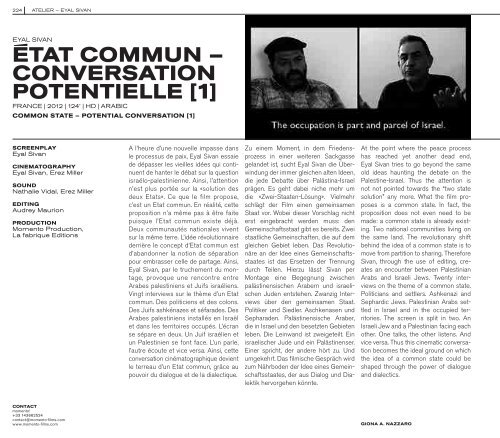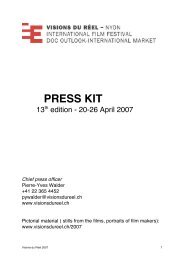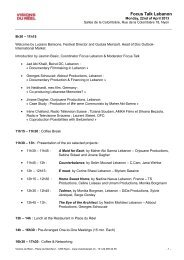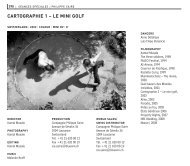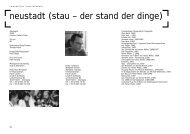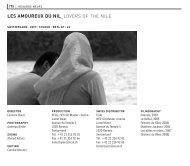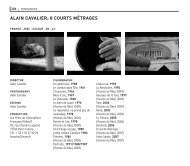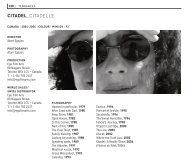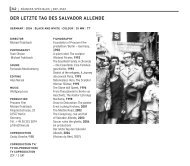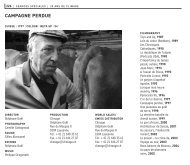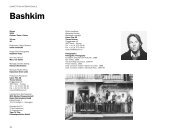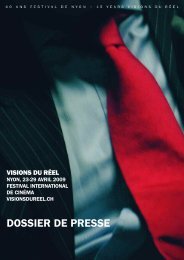Katalog 2013.pdf - Visions du Réel
Katalog 2013.pdf - Visions du Réel
Katalog 2013.pdf - Visions du Réel
You also want an ePaper? Increase the reach of your titles
YUMPU automatically turns print PDFs into web optimized ePapers that Google loves.
224 atelier – eyal sivan<br />
Eyal Sivan<br />
État commun –<br />
Conversation<br />
potentielle [1]<br />
France | 2012 | 124’ | HD | Arabic<br />
Common State – Potential Conversation [1]<br />
Screenplay<br />
Eyal Sivan<br />
Cinematography<br />
Eyal Sivan, Erez Miller<br />
Sound<br />
Nathalie Vidal, Erez Miller<br />
Editing<br />
Audrey Maurion<br />
Pro<strong>du</strong>ction<br />
Momento Pro<strong>du</strong>ction,<br />
La fabrique Editions<br />
A l’heure d’une nouvelle impasse dans<br />
le processus de paix, Eyal Sivan essaie<br />
de dépasser les vieilles idées qui continuent<br />
de hanter le débat sur la question<br />
israélo-palestinienne. Ainsi, l’attention<br />
n’est plus portée sur la «solution des<br />
deux Etats». Ce que le film propose,<br />
c’est un Etat commun. En réalité, cette<br />
proposition n’a même pas à être faite<br />
puisque l’Etat commun existe déjà.<br />
Deux communautés nationales vivent<br />
sur la même terre. L’idée révolutionnaire<br />
derrière le concept d’Etat commun est<br />
d’abandonner la notion de séparation<br />
pour embrasser celle de partage. Ainsi,<br />
Eyal Sivan, par le truchement <strong>du</strong> montage,<br />
provoque une rencontre entre<br />
Arabes palestiniens et Juifs israéliens.<br />
Vingt interviews sur le thème d’un Etat<br />
commun. Des politiciens et des colons.<br />
Des Juifs ashkénazes et séfarades. Des<br />
Arabes palestiniens installés en Israël<br />
et dans les territoires occupés. L’écran<br />
se sépare en deux. Un Juif israélien et<br />
un Palestinien se font face. L’un parle,<br />
l’autre écoute et vice versa. Ainsi, cette<br />
conversation cinématographique devient<br />
le terreau d’un Etat commun, grâce au<br />
pouvoir <strong>du</strong> dialogue et de la dialectique.<br />
Zu einem Moment, in dem Friedensprozess<br />
in einer weiteren Sackgasse<br />
gelandet ist, sucht Eyal Sivan die Überwin<strong>du</strong>ng<br />
der immer gleichen alten Ideen,<br />
die jede Debatte über Palästina-Israel<br />
prägen. Es geht dabei niche mehr um<br />
die «Zwei-Staaten-Lösung». Vielmehr<br />
schlägt der Film einen gemeinsamen<br />
Staat vor. Wobei dieser Vorschlag nicht<br />
erst eingebracht werden muss: den<br />
Gemeinschaftsstaat gibt es bereits. Zwei<br />
staatliche Gemeinschaften, die auf dem<br />
gleichen Gebiet leben. Das Revolutionäre<br />
an der Idee eines Gemeinschaftsstaates<br />
ist das Ersetzen der Trennung<br />
<strong>du</strong>rch Teilen. Hierzu lässt Sivan per<br />
Montage eine Begegnung zwischen<br />
palästinensischen Arabern und israelischen<br />
Juden entstehen. Zwanzig Interviews<br />
über den gemeinsamen Staat.<br />
Politiker und Siedler. Aschkenasen und<br />
Sepharaden. Palästinensische Araber,<br />
die in Israel und den besetzten Gebieten<br />
leben. Die Leinwand ist zweigeteilt. Ein<br />
israelischer Jude und ein Palästinenser.<br />
Einer spricht, der andere hört zu. Und<br />
umgekehrt. Das filmische Gespräch wird<br />
zum Nährboden der Idee eines Gemeinschaftsstaates,<br />
der aus Dialog und Dialektik<br />
hervorgehen könnte.<br />
At the point where the peace process<br />
has reached yet another dead end,<br />
Eyal Sivan tries to go beyond the same<br />
old ideas haunting the debate on the<br />
Palestine-Israel. Thus the attention is<br />
not not pointed towards the “two state<br />
solution” any more. What the film proposes<br />
is a common state. In fact, the<br />
proposition does not even need to be<br />
made: a common state is already existing.<br />
Two national communities living on<br />
the same land. The revolutionary shift<br />
behind the idea of a common state is to<br />
move from partition to sharing. Therefore<br />
Sivan, through the use of editing, creates<br />
an encounter between Palestinian<br />
Arabs and Israeli Jews. Twenty interviews<br />
on the theme of a common state.<br />
Politicians and settlers. Ashkenazi and<br />
Sephardic Jews. Palestinian Arabs settled<br />
in Israel and in the occupied territories.<br />
The screen is split in two. An<br />
Israeli Jew and a Palestinian facing each<br />
other. One talks, the other listens. And<br />
vice versa. Thus this cinematic conversation<br />
becomes the ideal ground on which<br />
the idea of a common state could be<br />
shaped through the power of dialogue<br />
and dialectics.<br />
Contact<br />
momento!<br />
+33 143662524<br />
contact@momento-films.com<br />
www.momento-films.com<br />
Giona A. Nazzaro


